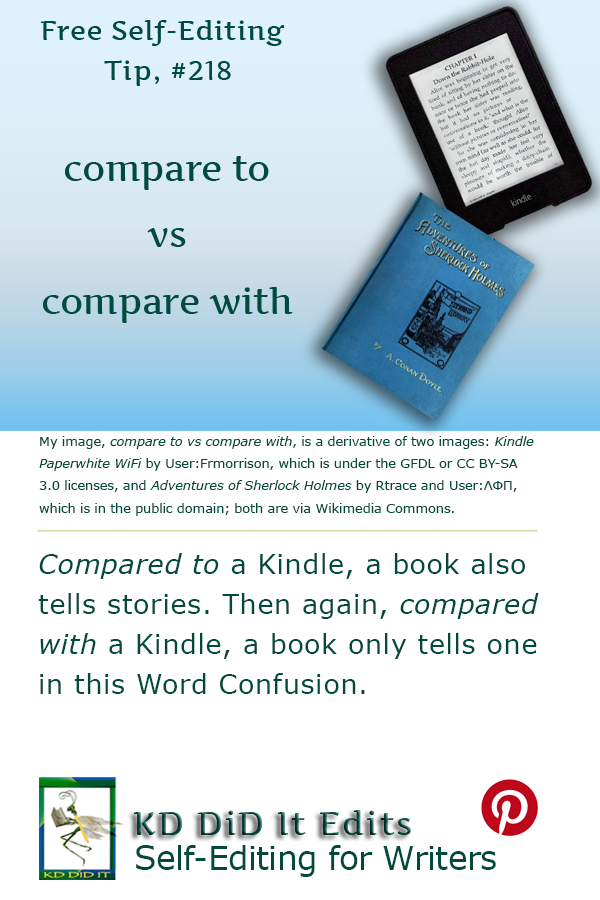Revised as of
5 Nov 2022
In this word confusion, compare to and compare with are similar only in that the first word in each phrase is compare. Once you add either preposition, the meanings reverse depending on which word you use: to or with.
Compare to points up the similarities between what appears to be different things.
Compare with points up the differences between what seems to be similar things.
It is a distinction that is becoming less observed, and important enough that you should pay attention to the differences if you are writing a formal paper or nonfiction.
Word Confusions . . .
. . . started as my way of dealing with a professional frustration with properly spelled words that were out of context in manuscripts I was editing as well as books I was reviewing. It evolved into a sharing of information with y’all. I’m hoping you’ll share with us words that have been a bête noire for you from either end. Consider sharing this Word Confusion with friends by tweeting it.
| Compare To | Compare With |
|---|---|

Israeli IDF Soldiers Compare to Palestinian Arab Terrorists is Dxrd’s own work under the CC BY-SA 3.0 license, via Wikimedia Commons. — An excellent example of wrongfully using “compare to”, as this compares two apparently similar people, but shows how different the soldier who uses his own people as a shield with the soldier who fights to protect his people. |

Media Comparison by self (Taken by “me”) is under the BSD, or CC BY-SA 3.0 license, via Wikimedia Commons. — When comparing the thumb drive with the SD card and the Micro-SD card, the dissimilar appearances resolve into realizing they are each capable of storing 8Gb of digital data. |
| Part of Grammar: | |
| Verb, transitive
Third person present verb: compares to |
Verb, intransitive
Third person present verb: compares with |
Used to show how two apparently different things are similar
|
Used to show how two apparently similar things are different
[Grammar] To form or display the degrees of comparison of an adjective or adverb |
| Examples: | |
| “Shall I compare thee to a summer’s day?” – William Shakespeare, Sonnet 18
Dying is easy compared to giving a speech. Total attendance figures were 28,000, compared to 40,000 at last year’s event. Her novel was compared to the work of Daniel Defoe. He compared the religions to different paths toward the peak of the same mountain. |
Public education doesn’t compare with home schooling.
Individual schools compared their facilities with those of others in the area. The survey compares prices in different countries with those in our country. Salaries at Engeeno compare favorably with those of other professions. Sales were modest and cannot compare with the glory days of 1989. Before voting, one should always compare the candidate’s claims with his actual performance. |
| Derivatives: | |
| Adjective: uncompared Noun: comparer, comparison Verb, transitive: intercompare, intercompared, intercomparing, precompare, precompared, precomparing, recompare, recompared, recomparing |
|
| History of the Word: | |
| Late Middle English from the Old French comparer, from the Latin comparare, from compar (like, equal), from com- (with) + par (equal). | |
C’mon, get it out of your system, bitch, whine, moan . . . which words are your pet peeves? Also, please note that I try to be as accurate as I can, but mistakes happen or I miss something. Email me if you find errors, so I can fix them . . . and we’ll all benefit!
Satisfy your curiosity about other Word Confusions on its homepage or more generally explore the index of self-editing posts. You may also want to explore Book Layout & Formatting Ideas, Formatting Tips, Grammar Explanations, Linguistics, Publishing Tips, the Properly Punctuated, Writing Ideas and Resources, and Working Your Website.
Resources for Compare To versus Compare With
Apple Dictionary.com
Pinterest Photo Credits
Kindle Paperwhite WiFi by User:Frmorrison is under the GFDL or CC BY-SA 3.0 licenses, and Adventures of Sherlock Holmes by Rtrace (upload first version) User:ΛΦΠ (upload second version) (OpenLibrary.org) is in the public domain; both are via Wikimedia Commons.


